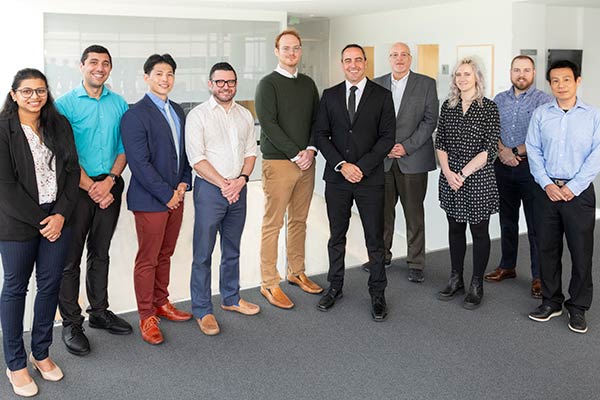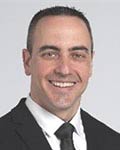About Us

The Center for Diagnostics and Artificial Intelligence engages with other institutes and groups within Cleveland Clinic to support and strengthen activities and initiatives for research, process improvements & clinical care enhancements.
Mission
Research & Innovation
- Serve as a major incubator of AI/ML innovations (i.e. novel software and technology platforms).
- Build new ML tools that address current & future needs.
- Provide AI/ML support on research, quality and operational initiatives.
Clinical & Operational Tools
- Employ automation and machine learning to optimize operational workflows, reduce cost and improve staff utilization.
- Utilize AI/ML and data to make Pathology and Laboratory Medicine the most efficient and safe environment for laboratory testing in the world.
- Use digital pathology to enhance our ability to diagnose tissue-based specimens efficiently, safely, and reproducibly.
Education
- Re-imagine how we diagnose and treat all human diseases.
- Create new fully Interactive AI/ML in Healthcare e-learning courses.
- Make Cleveland Clinic the most AI/ML-literate medical institution in the world by providing unique educational resources.
Leadership
Samer Albahra, MD
Co-Director, Center for Diagnostics and Artificial Intelligence
Director, Research and Development, Pathology & Lab Medicine
Scott Robertson, MD, PhD
Co-Director, Center for Diagnostics and Artificial Intelligence
Director, Image Analytics, Pathology & Lab Medicine

Daniel Lallo
Administrator, Center for Diagnostics and Artificial Intelligence
Research & Innovation
We work closely with clinical research groups for their AI/ML needs. In addition, we are building ML tools that address current and future needs. For example, one major need in data science is easier access to data. Regulatory aspects prevent this from happening, but one solution is to use synthetic data that emulates real data. This method is great for pilot studies and encourages staff to do more studies and to test out their ideas with fewer regulatory aspects.
Machine learning applications
Our team applies advanced machine learning techniques to address critical challenges in pathology and across the health system. Current applications include:
- Text, Image, and Video Understanding with Large Language Models (LLMs): We leverage LLMs to extract meaningful insights from unstructured clinical data sources such as physician notes, diagnostic images, and lab videos.
- Predictive Modeling for Surgical Outcomes and Test Volumes: Our forecasting models support operational planning by predicting patient outcomes and anticipating diagnostic testing demands.
- Cell Identification in Whole Slide Imaging (WSI): Using deep learning we enable precise identification and classification of cells in high-resolution pathology slide images, enhancing diagnostic accuracy and efficiency.
Machine learning tools innovation
Some machine learning innovations developed by our team are actively supporting care across Cleveland Clinic.
STNG (Synthetic Tabular Neural Generator)
STNG is a novel, powerful automated ML tool for tabular synthetic data generation. It uses a combination of sophisticated platforms to build synthetic (not representative of a real patient) datasets that can emulate their real dataset counterparts. In short, it allows you to start with synthetic data for your pilot ML or Non-ML study to assess feasibility before requesting IRB approval.
PIRO (Pathology Information Retrieval Optimizer)
Provides full text search capability on the anatomic pathology reports for Cleveland Clinic Hospitals, improving the ability to query anatomic pathology reports for clinical, operational, research, and educational purposes. PIRO searches on approximately 7 million case and patient records, across approximately 50 million case comments.
- Fast, easy data searches.
- Compliance with regulatory stakeholders (IRB, HIPPA, Legal).
- Data extraction workflow.
- Workflow for building cohorts, adding annotations, and generating study barcodes.
Education
AI/ML in Healthcare Course
We've created a new AI/ML in Healthcare e-learning course, which launched in early 2024. This course is fully interactive, healthcare-focused, and no coding or programming is required. Participants are provided tools and sample datasets to participate in and complete interactive projects; create image-based ML models (e.g. a Cancer versus No Cancer prediction tool, etc.); and make tabular data-based ML models (e.g. Diabetes outcome predictor tool, etc.) By the end of the course, participants will gain an enhanced AI/ML literacy and a better understanding of ML-related statistics.
Course instructors
Hooman Rashidi, MD
Course Instructor: ML basics, Statistics Overview, Deep Learning & Supervised Algorithms & Unsupervised Methods
Walter Henricks, III, MD
Course Instructor: Data Acquisition, Visualization & Regulatory Aspects
Scott Robertson, MD, PhD
Course Instructor: Image Analytics/ Deep Learning Course Project
Samer Albahra, MD
Course Instructor: Natural Language Processing & ML Deployment